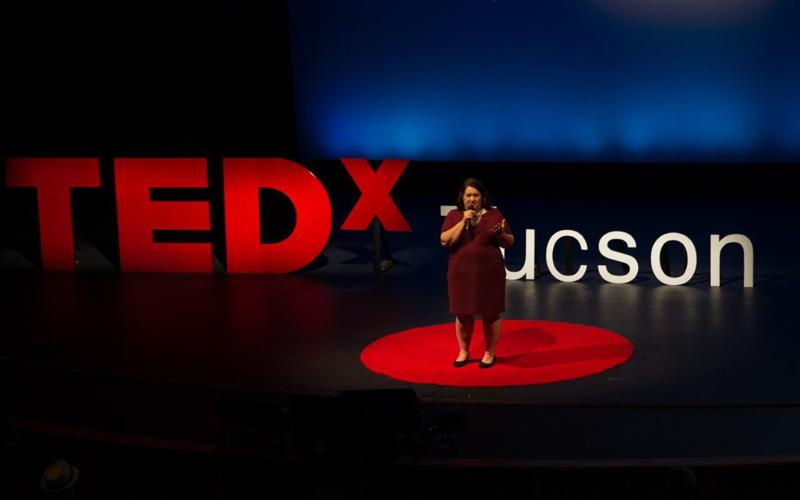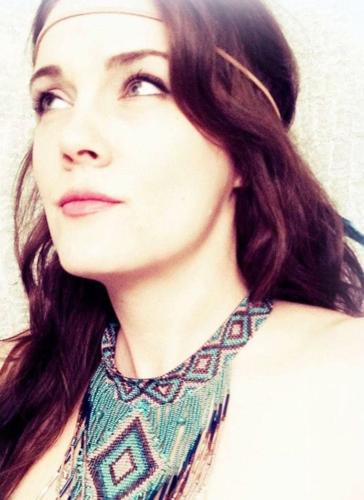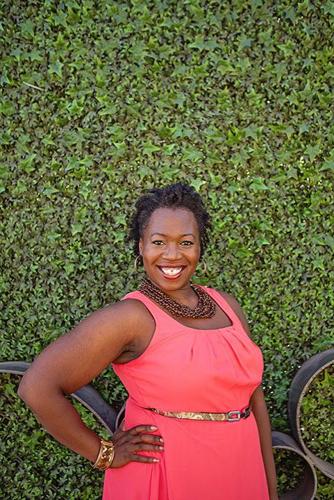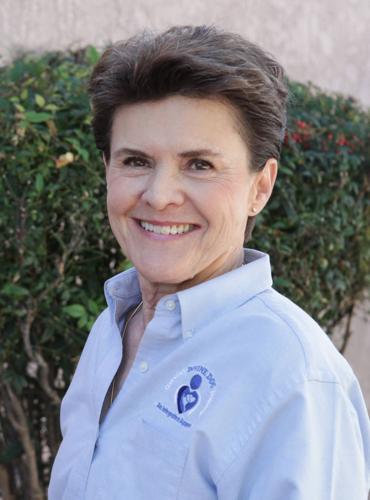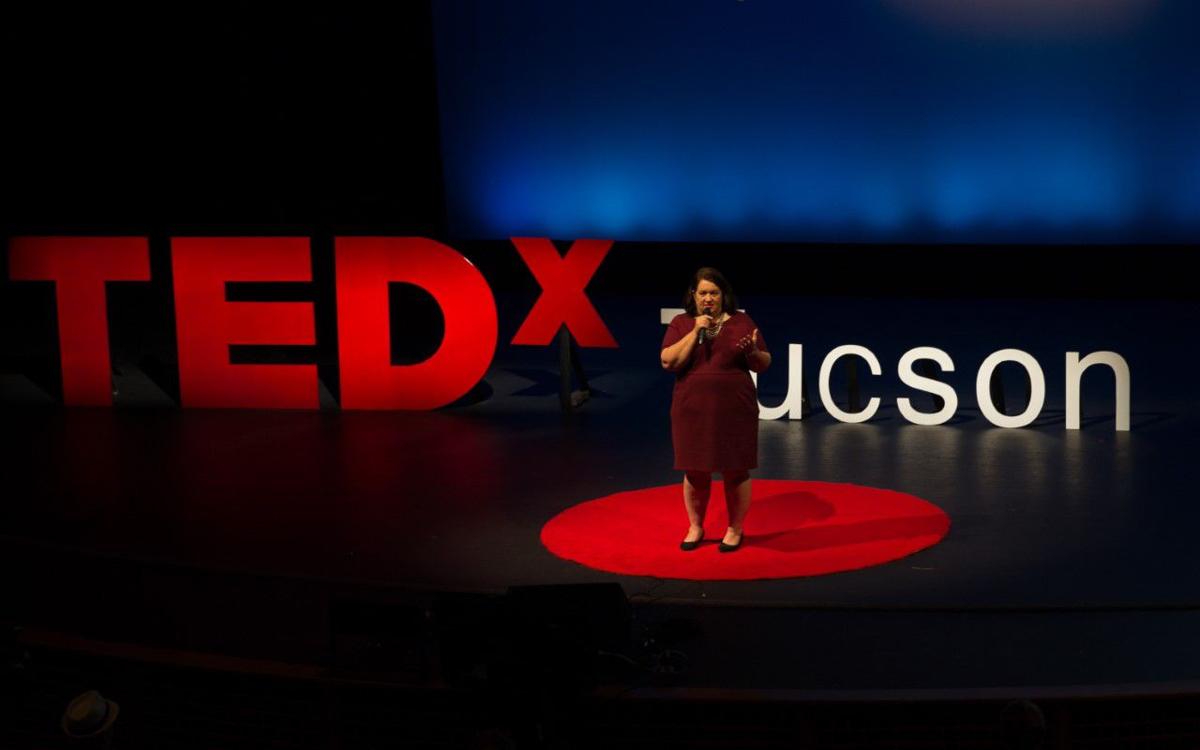Mary Reed joined the TEDxTucson staff to connect with her community — a city that showered her in love after she was shot three times in a Safeway parking lot, Jan. 8, 2011.
As one of the victims shot at Rep. Gabrielle Giffords' "Congress on Your Corner" event, Reed found herself on the receiving end of meals from "strangers and church people and Cub Scout troops."
She discovered TED Talks at that time and knew Tucson, with its recent show of generosity and strength, had its own set of ideas worth sharing.
Joining the staff of TEDxTucson in 2013 gave her a chance to showcase the ideas of the community that had come to her aid.
And that's just what she and her team did this past weekend, at the nonprofit's annual conference, one of several TEDxTucson events throughout the year. This conference drew about 450 attendees and about 100 volunteers.
"I hope participants walk away with ideas worth spreading and knowing that there is a strong, resilient community of people who love ideas right here in Tucson..." Reed, 58, says. "I also hope they walk way with connections with members of the community they would not have met or interacted with otherwise."
Of the 10 speakers at the Saturday, Jan. 14 event the majority hailed from Southern Arizona, says Reed, the CEO of the nonprofit and organizer of the conference. A few made the drive from Phoenix and beyond.
TED events are open to speakers with any ideas — as long as they are compelling and align with the event theme. In this case, "Imagine."
Topics at the event ranged from water conservation to goal achievement to health literacy, poverty and more.
We chatted up three of the Tucson speakers to get a recap of their talks and the personal stories that motivated them. Note that none of these ladies had much prior experience with public speaking before TEDxTucson.
Danielle McFarlin, 35, real estate investor

Danielle McFarlin
Talk title. "Warrior Spirit: Bringing Sexual Abuse out of the Shadows."
Tell us about your talk.
"My talk was about my experiences with childhood sexual abuse and rape later on life. I was really hoping to get a conversation started because it's a topic nobody really talks about and just open up communication so if someone watched the video (recap) with their kids, they have a better way of making the conversation less uncomfortable."
Share a bit of your own story.
"I was 28 or 29 and I heard that one of my middle school science teachers was charged with raping a 14-year-old student. This is a man that several girls and I reported to our principal when we were in middle school because we felt uncomfortable with his inappropriate comments. We were dismissed and told we were being manipulative. Nothing ever happened to him. When I heard about the charges I was furious because the one time I tried to use my voice, I wasn't taken seriously. I wished I had refused to back down until someone listened, maybe I could've saved the 14-year-old. That's when I decided silence was no longer optional. I was going to scream my story from the mountain tops and I would refuse to be silenced. I ended up calling old abusers and recording the calls. I later took the tapes to the police and opened a case (there is no statute of limitations in Arizona) 20-some years after the abuse. Unfortunately there wasn't enough of a confession to prosecute. I knew I had to be louder. TEDxTucson was my louder!"
How difficult was it to share such a personal story with a large audience?
"Initially it was sharing it with people close to me and talking one-on-one to my mom and dad and siblings, and they were really positive in their responses and it gave me the strength and courage to share it outside my circle as well. It was about 2010 when I started to really work on healing this part of my life. ... There were a lot of women who came up just to thank me (after the talk) and tell me how courageous it was, and that was great. A lot of survivors were able to say, 'Thanks for telling my story.' ... It's extremely vulnerable to share such a private part of my life and something I had to keep secret for so long, and it was empowering to have a voice and say this doesn't control me. This doesn't define me."
Did you feel pressure that you were representing the stories of other women?
"There is a tremendous amount of responsibility to be able to tell a story without deeply triggering everybody else, however I knew if I didn't do it, I couldn't wait for somebody else to do it because clearly it wouldn't happen. My husband was actually key and great at encouraging me. There were times that I felt like quitting, like I don't need to do this."
So why did you do it?
"I think it's the fact that I'm a mother and have children and nieces and nephews and see young children and have to say, 'Are they one of them? Have they been abused? Or will they?' This is way bigger than me."
Karyn Garvin, 63, dog trainer with Garvin's Divine Dog Training, author

Karyn Garvin
Talk title: "Diagnosing Dog Behavior Correctly Will Save Dogs' Lives."
Tell us about your talk.
"The primary thought was to explain the difference between separation anxiety and containment phobia and also to share how important it is that we understand the difference ... I would say a minimum of 15 percent of our entire dog population will experience some level of containment phobia. The behavior is not understood and there is no cure for misdiagnosed behavior."
Share a bit of your own story.
"I have been a dog trainer since 1978 ... In the late 70s, the fad was wolf hybrids ... I ended up going to tons of homes with wolf hybrids and pure wolves, and I saw destructive behavior on a regular basis ... They freaked out about being contained. ... So when I saw it in the everyday dog, the German shepherd, the poodle, the Lhasa Apso, I recognized the behavior."
What's the difference between containment phobia and separation anxiety?
"Destructive behavior is a way of venting. The only thing that these two conditions have in common, which has clouded thinking of the multitudes, is the destructive behavior occurs when the owner leaves. You can tell by what the dog chooses to destroy. That's the difference between separation anxiety and containment phobia. Are they freaked out about being confined and trying to escape? Or are they venting frustration?"
Why is this so important to understand?
"A huge percentage of dogs that end up in the shelters, it's because of behavior issues people didn't know how to deal with. Dogs with containment phobia are more likely to end up in a shelter because people can't keep them contained and don't understand the behavior."
What was the highlight of the talk for you?
"I did it. I shared a message that I am so serious about getting out into the world. I had that opportunity, which is what TEDx is: The opportunity to give someone little like myself the opportunity to share a very important idea. It took all of the courage in the world for me to get up there and do it, but the idea is that important to me."
How do you hope people are impacted?
"It's about saving a dog's life. It's about saving the hearts of numerous, troubled owners whose dogs have been misdiagnosed."
Adiba Nelson, 39, writer

Adiba Nelson
Talk title: "Skating Downhill: The Art of Claiming Your Life."
Tell us about your talk.
"The overall gist of my talk was not letting your circumstances in life stop you from going after your dreams and claiming your life for whatever you want it to be."
Share a bit of your own story.
"Life for me has not been a crystal staircase. It has been more like a dingy stairwell ... but I've made it. I've survived and thrived. ... I grew up ridiculously dirt poor in New York City ... My mom and I lived in shelters trying to move away from my father, we lived with family a lot ... and sometimes we lived in boarding houses, literally a room in a house that we rented. We slept in bunk beds and we had a TV tray that we ate on and a corner cabinet that held food, toiletries and clothes ... and there were times when I had to eat rice everyday for breakfast, lunch and dinner. ...
"It never dawned on me that I was poor like that, and then I had my daughter and I was a single mom ... because she has a disability that affects her in different ways, it was very difficult to find employment because of therapy and doctors' appointments. ... I found myself living off of food stamps and getting help from friends ... At one point, it got so bad I was really freaking out, like I can't take care of her ... but no. She's my kid and I know I can do this and I didn't get this far in life to just stop.
"At the time, I was working on a children's book that was in the process of being illustrated. ... A friend told me I had to publish it. It stuck with me that my story doesn't end here. ... I just went full steam ahead and said, 'This is what my life is going to be like,' and I once I made that declaration that this is not where my story ends and this is who I'm going to be in life, everything started falling into place."
What do you hope people took away from your talk?
"I wouldn't have been able to do it had I let circumstances hold me back, and I know many people, mainly women, who do ... whether it's age or circumstance or appearance or self doubt, things they have been told ... none of that has any power over their life. You do. You get to dictate who and what you are."


